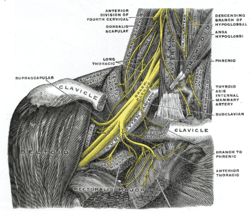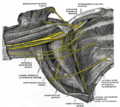긴가슴신경
| 긴가슴신경 | |
|---|---|
 왼쪽 상지의 신경. 긴가슴신경은 어깨에 수직 방향으로 동맥 왼쪽에 표시되어 있다. | |
 오른쪽 팔신경얼기. 긴가슴신경은 중간 부분에 위쪽에서 세 번째로 표시되어 있다. | |
| 정보 | |
| 기원 | 팔신경얼기 (C5-C7) |
| 분포 구조 | 앞톱니근 |
| 식별자 | |
| 라틴어 | nervus thoracicus longus |
| 영어 | long thoracic nerve |
| TA98 | A14.2.03.012 |
| TA2 | 6410 |
| FMA | 65275 |
긴가슴신경(long thoracic nerve, external respiratory nerve of Bell, posterior thoracic nerve) 또는 장흉신경(長胸神經) 은 앞톱니근에 분포하는 신경이다.
구조
[편집]긴가슴신경은 C5, C6, C7 척수신경의 앞가지에서 시작된다.[1][2][3] C7에서 나오는 뿌리는 종종 존재하지 않을 수 있다.[4] C5와 C6에서 나오는 뿌리는 중간목갈비근을 관통하고, C7 뿌리는 중간목갈비근 앞쪽을 주행한다.
긴가슴신경은 목겨드랑관을 따라 밑으로 내려간다. 팔신경얼기,[3] 겨드랑동맥, 겨드랑정맥의 뒤쪽에 위치한다.[4] 아래쪽으로 주행하며 빗장뼈 깊은 쪽에 오게 된다.[2] 그 후 앞톱니근의 바깥쪽 면에 놓이게 되고 가슴의 측면을 따라 주행하여 앞톱니근의 아래쪽 경계에 이른다.[5][6] 긴가슴신경은 앞톱니근 각각의 근육가지에 분포한다.[5][6]
기능
[편집]긴가슴신경은 앞톱니근을 지배한다.[1] 앞톱니근은 어깨뼈를 내미는 작용을 하며, 이런 움직임은 펀치를 내지르거나 할 때 나타난다. 또한 등세모근의 위쪽, 아래쪽 부분과 협동하여 어깨뼈를 위쪽으로 돌리는 작용을 하며, 이 움직임은 물건을 머리 위로 올릴 때 일어난다.[7]
임상적 중요성
[편집]긴가슴신경은 길고 비교적 얕은 곳에서 주행하기 때문에 직접적인 외상이나 신장(stretch)에 의해 손상되기 쉽다.[8] 손상의 원인에는 다음과 같은 것들이 있다.
- 신경의 병변.[3]
- 여러 가지 스포츠로 인한 부상.
- 어깨와 가슴 부위의 수술.[9] 유방암 치료를 위해 겨드랑림프절을 제거하는 경우에도 손상이 나타날 수 있다.[10]
- 무거운 물건을 어깨 위로 오랜 시간 들어올릴 때 손상될 수 있다.[11]
- 파르소니지 터너 증후군(Parsonage Turner Syndrome).[12]
- 외상이나 감염.[9]
증상이 거의 나타나지 않는 경우도 종종 있다. 만일 증상이 있다면 어깨 뒤쪽에 작열통을 느끼기도 한다. 특히 병변에 의한 일부 손상의 경우 앞톱니근을 마비시켜 날개어깨뼈의 원인이 된다.[3][13] 팔이 앞쪽으로 들어 올려지거나 환자가 팔을 뻗어 벽을 밀 때 가장 잘 나타난다. 그러나 수 주 뒤 등세모근이 충분히 신장하여 손상이 있다는 것을 밝히기 전까지는 날개어깨뼈가 나타나도 긴가슴신경이 손상되었다고 분명히 말하기는 어려울 수 있다.[14]
추가 이미지
[편집]-
오른쪽 팔신경얼기의 빗장아래부분. 겨드랑오목에 위치하고 있으며 아래앞쪽에서 본 그림.
-
팔신경얼기.
-
척수신경을 색깔별로 나타낸 팔신경얼기 경로.
각주
[편집]- ↑ 가 나 Rakocevic, G. (2014년 1월 1일), 〈Thoracic Nerve, Long〉, Aminoff, Michael J.; Daroff, Robert B., 《Encyclopedia of the Neurological Sciences (Second Edition)》 (영어), Oxford: Academic Press, 448–450쪽, doi:10.1016/b978-0-12-385157-4.00699-0, ISBN 978-0-12-385158-1, 2020년 10월 25일에 확인함
- ↑ 가 나 Tubbs, R. Shane; Goodrich, Dylan; Watanabe, Koichi; Loukas, Marios (2015년 1월 1일), Tubbs, R. Shane; Rizk, Elias; Shoja, Mohammadali M.; Loukas, Marios, 편집., “Chapter 43 - Anatomic Landmarks for Selected Nerves of the Head, Neck, and Upper and Lower Limbs”, 《Nerves and Nerve Injuries》 (영어) (San Diego: Academic Press), 575–588쪽, doi:10.1016/b978-0-12-410390-0.00045-7, ISBN 978-0-12-410390-0, 2020년 10월 25일에 확인함
- ↑ 가 나 다 라 Ryan, Monique M.; Jones, H. Royden (2015년 1월 1일), Darras, Basil T.; Jones, H. Royden; Ryan, Monique M.; De Vivo, Darryl C., 편집., “Chapter 14 – Mononeuropathies”, 《Neuromuscular Disorders of Infancy, Childhood, and Adolescence (Second Edition)》 (영어) (San Diego: Academic Press), 243–273쪽, doi:10.1016/b978-0-12-417044-5.00014-7, ISBN 978-0-12-417044-5, 2020년 10월 25일에 확인함
- ↑ 가 나 Tomberlin, John (2009년 1월 1일), Wilk, Kevin E.; Reinold, Michael M.; Andrews, James R., 편집., “CHAPTER 53 - Neurodynamic Techniques for the Athlete's Shoulder”, 《The Athlete's Shoulder (Second Edition)》 (영어) (Philadelphia: Churchill Livingstone), 707–717쪽, doi:10.1016/b978-044306701-3.50056-6, ISBN 978-0-443-06701-3, 2020년 10월 25일에 확인함
- ↑ 가 나 Fischer, J. (2012). Anatomy of the Axilla. Fischer's Mastery of Surgery, 2 Volume Set. Retrieved September 20, 2015 from http://www.r2library.com/Resource/Title/1608317404/ch0046s1193
- ↑ 가 나 Bertelli, Jayme Augusto (2005). “Long Thoracic Nerve: Anatomy and Functional Assessment”. 《The Journal of Bone and Joint Surgery. American Volume》 87 (5): 993–8. doi:10.2106/JBJS.D.02383. ISSN 0021-9355. PMID 15866961.
- ↑ Lung, Kirsten; St Lucia, Kayla; Lui, Forshing (2022), “Anatomy, Thorax, Serratus Anterior Muscles”, 《StatPearls》 (Treasure Island (FL): StatPearls Publishing), PMID 30285352, 2022년 6월 12일에 확인함
- ↑ Ostrowska, Monika; de Carvalho, Mamede (2015년 1월 1일), Tubbs, R. Shane; Rizk, Elias; Shoja, Mohammadali M.; Loukas, Marios, 편집., “Chapter 34 - Injuries of the Nerves of the Thorax”, 《Nerves and Nerve Injuries》 (영어) (San Diego: Academic Press), 525–543쪽, doi:10.1016/b978-0-12-802653-3.00083-x, ISBN 978-0-12-802653-3, 2020년 10월 25일에 확인함
- ↑ 가 나 “An Isolated Long Thoracic Nerve Injury in a Navy Airman” (PDF). 《MILITARY MEDICINE》. 2004.
- ↑ Belmonte, Roser; Monleon, Sandra; Bofill, Neus; Alvarado, Martha Ligia; Espadaler, Josep; Royo, Inmaculada (2015). “Long thoracic nerve injury in breast cancer patients treated with axillary lymph node dissection”. 《Supportive Care in Cancer: Official Journal of the Multinational Association of Supportive Care in Cancer》 23 (1): 169–175. doi:10.1007/s00520-014-2338-5. ISSN 1433-7339. PMID 25035064.
- ↑ Berthold, Justin B.; Burg, Timothy M.; Nussbaum, Ryan Paul (2017년 2월 1일). “Long Thoracic Nerve Injury Caused by Overhead Weight Lifting Leading to Scapular Dyskinesis and Medial Scapular Winging”. 《Journal of Osteopathic Medicine》 (영어) 117 (2): 133–137. doi:10.7556/jaoa.2017.025. ISSN 2702-3648.
- ↑ Monteiro dos Santos, Ricardo Barreto; dos Santos, Saulo Monteiro; Carneiro Leal, Flávio José Câmara; Lins, Otávio Gomes; Magalhães, Carmem; Mertens Fittipaldi, Ricardo Bruno (2015년 4월 17일). “Parsonage–Turner syndrome”. 《Revista Brasileira de Ortopedia》 50 (3): 336–341. doi:10.1016/j.rboe.2015.04.002. ISSN 2255-4971. PMC 4519651. PMID 26229940.
- ↑ Le Nail, L. R.; Bacle, G.; Marteau, E.; Corcia, P.; Favard, L.; Laulan, J. (June 2014). “Isolated paralysis of the serratus anterior muscle: surgical release of the distal segment of the long thoracic nerve in 52 patients”. 《Orthopaedics & Traumatology, Surgery & Research》 100 (4 Suppl): S243–248. doi:10.1016/j.otsr.2014.03.004. ISSN 1877-0568. PMID 24703793.
- ↑ Preston, David C.; Shapiro, Barbara E. (2013년 1월 1일), Preston, David C.; Shapiro, Barbara E., 편집., “31 - Proximal Neuropathies of the Shoulder and Arm”, 《Electromyography and Neuromuscular Disorders (Third Edition)》 (영어) (London: W.B. Saunders), 487–500쪽, doi:10.1016/b978-1-4557-2672-1.00031-3, ISBN 978-1-4557-2672-1, 2020년 10월 25일에 확인함

